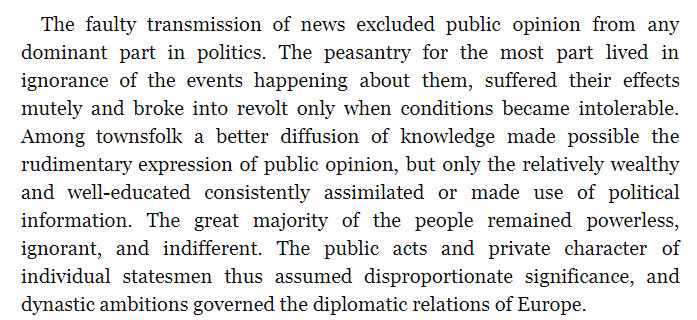- Facebook416
- Total 416
C.V. (Veronica) Wedgewood’s The Thirty Years War is almost a century old, but it remains an inexhaustible source of insights. TaNahisi Coates loves it, too: “Take this for whatever it’s worth but she writes better than any historian I’ve ever read. Like all of my favorite writers she paints in all colors. … This is just a thrilling book. Sometimes it’s too pretty, and the details are too on point, but the insights are so thorough and the narrative so gripping that it’s hard to turn away.”
Here’s an example. Wedgewood asks how dynastic politics–births and marriages–could have been so influential. The Hapsburg Empire, for example, was the greatest power in Europe and it formed because of royal weddings. “The dynasty was, with few exceptions, more important in European diplomacy than the nation. Royal marriages were the rivets of international policy and the personal will of the sovereign or the interests of the family its motive forces. For all practical purposes France and Spain are misleading terms for the dynasties of Bourbon and Hapsburg.”
(Wedgewood doesn’t mention the Ottomans, but they were also a family, not a people. The Ottoman Empire was proudly multinational, not Turkish, and it was defined by the fact that the Sultan was the lineal descendant of Osman I [1258-1326]. In Topkapi, marriages weren’t relevant, but it mattered which heir obtained the throne.)
How could the fates of millions be determined by who married whom in a few families?Wedgewood thinks the reason is information:

This is an interesting explanatory thesis. Perhaps it could be restated thus: Everyone has political interests. But in order to act on their interests, people need information and the ability to coordinate. Without information, the peasants and most of the middle class were rendered powerless ca. 1600. That left the great aristocrats to govern, and they could best understand and use their own relationships to shape the world. (They presumably had poor information about things like economics and demographics.) Their relationships were transparent to the masses–for example, everyone knew when the king got married–so the most likely point for popular involvement was in supporting or blocking a dynastic union.
This thesis also raises questions about our own time. Today, we have information by the gibibyte. What we lack is the ability to focus attention on the important stuff. It’s easier to grasp Donald Trump’s marital and extramarital relations than to follow how HHS is undermining Obamacare. One dominant man holds extraordinary power–and celebrity–in China, Russia, India, Turkey, and many other countries. It’s conceivable that the 21st century will look more like the 16th than the 20th in this respect.
